-
by sayum
14 February 2026 2:22 PM



The High Court of Calcutta today reaffirmed the legal tenets surrounding negligence under the Indian Penal Code as it upheld the conviction of Golap Sk. For causing death by negligence but altered the terms of his sentence.
Initially convicted by the Fast Track 1st Court in Lalbagh, Murshidabad, Golap Sk. Faced charges under Section 304A IPC after his motorcycle struck and killed Karim Sk. In March 2012. The lower court sentenced him to one year of simple imprisonment and imposed a fine of Rs. 5,000. The High Court, however, modified this sentence by removing the imprisonment and increasing the fine to Rs. 10,000, aimed to be paid as compensation to the deceased’s family.
This case originated from an incident where Golap Sk., riding his motorcycle at a high speed, fatally collided with the victim. The prosecution successfully argued their case with evidence from the victim’s wife and son, alongside eyewitness accounts. The primary legal challenge revolved around the interpretation of “negligence” under Section 304A and the appropriate sentencing for such a conviction.
Justice Shampa Dutt (Paul) analyzed the legislative intent behind Section 304A, emphasizing the necessity of establishing that the act was rash and negligent and led directly to death. The judge remarked:
“To bring a cause of homicide under sec. 304A IPC, the death, the act causing such death, and the negligent nature of the act must be clearly established.”
On sentencing, the Court found it within its powers to enhance the sentence while prioritizing compensatory justice over punitive measures.
The judgment also referenced decisions like State of Punjab v. Balwinder Singh and Shankar Kerba Jadhav & Ors. Vs. State of Maharashtra, which guide the appellate powers in modifying sentences.
Conclusion: While the appeal was partially allowed, the decision to uphold the conviction underlines the court’s stance on negligence leading to death. The modification of the sentence to a fine underscores a shift towards financial compensation for the victim’s family over incarceration.
Date of Decision: May 3, 2024
Golap Sk. Vs. The State of West Bengal
